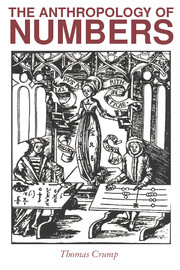Book contents
- Frontmatter
- Contents
- List of illustrations
- Preface
- Acknowledgements
- 1 The ontology of number
- 2 The cognitive foundations of numeracy
- 3 Number and language
- 4 Cosmology and ethnoscience
- 5 Economy, society and politics
- 6 Measurement, comparison and equivalence
- 7 Time
- 8 Money
- 9 Music, poetry and dance
- 10 Games and chance
- 11 Art and architecture
- 12 The ecology of number
- Notes
- References
- Index
- Cambridge Studies in Social and Cultural Anthropology
- Frontmatter
- Contents
- List of illustrations
- Preface
- Acknowledgements
- 1 The ontology of number
- 2 The cognitive foundations of numeracy
- 3 Number and language
- 4 Cosmology and ethnoscience
- 5 Economy, society and politics
- 6 Measurement, comparison and equivalence
- 7 Time
- 8 Money
- 9 Music, poetry and dance
- 10 Games and chance
- 11 Art and architecture
- 12 The ecology of number
- Notes
- References
- Index
- Cambridge Studies in Social and Cultural Anthropology
Summary
The definition and classification of games
Games, as a category of human activity, are easier to recognise than define. Taking two such different games, as hide-and-seek, as played by children, and the Mayan ballgame, where to lose was sometimes to be sentenced to death, it is difficult to see what they have in common. Three properties, which, if not sufficient to define the category unambiguously, are in practice common to almost all games.
First, games are fictive, in that their essential form is divorced from the reality of everyday life. In a sense a game is a performance, comparable to drama, but to be distinguished from it by the essential role of the numerical element. Any game contains an element of fantasy. A game may be a contest, but it is not a war between the contestants. A sport, such as boxing, has an equivocal status: much depends upon the context, so that prizefighting is hardly a game at all. Put another way, games are anti-economic, in the sense that any relation they may have to an economy is always extrinsic. On the other hand, in the realm of number, competitive sports must be taken into account, in part because of the economic and social consequences which turn on the numerical outcome.
Second, games have a clearly defined context – generally both in time and space. It is not only Eton which has playing-fields.
- Type
- Chapter
- Information
- The Anthropology of Numbers , pp. 115 - 127Publisher: Cambridge University PressPrint publication year: 1990



